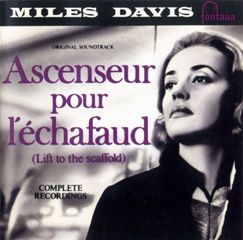Miles Davis - Ascenseur Pour L'Echafaud ST (1957)
Miles Davis - Ascenseur Pour L'Echafaud ST (1957)

1. "Nuit Sur Les Champs-Élysées (take 1)" 2:25 2. "Nuit Sur Les Champs-Élysées (take 2)" 5:20 3. "Nuit Sur Les Champs-Élysées (take 3)" 2:47 4. "Nuit Sur Les Champs-Élysées (take 4)" 2:59 5. "Assassinat (take 1)" 2:02 play 6. "Assassinat (take 2)" 2:10 7. "Assassinat (take 3)" 2:10 8. "Motel" 3:56 9. "Final (take 1)" 3:05 10. "Final (take 2)" 3:00 11. "Final (take 3)" 4:04 12. "Ascenseur" 1:57 13. "Le Petit Bal (take 1)" 2:40 14. "Le Petit Bal (take 2)" 2:53 15. "Séquence Voiture (take 1)" 2:56 16. "Séquence Voiture (take 2)" 2:16 17. "Générique" 2:45 18. "L' Assassinat de Carala" 2:10 play 19. "Sur L'Autoroute" 2:15 20. "Julien Dans L'Ascenseur" 2:07 21. "Florence Sur Les Champs Élysées" 2:50 22. "Diner au Motel" 3:58 23. "Évasion De Julien" 0:53 24. "Visite Du Vigile" 2:00 25. "Au Bar du Petit Bac" 2:50 26. "Chez Le Photographe Du Motel" 3:50 Personnel Miles Davis – trumpet Barney Wilen – tenor saxophone René Urtreger – piano Pierre Michelot – bass Kenny Clarke – drums
Jazz and film noir are perfect bedfellows, as evidenced by the soundtrack of Louis Malle's Ascenseur Pour L'Echafaud (Lift to the Scaffold). This dark and seductive tale is wonderfully accentuated by the late-'50s cool or bop music of Miles Davis, played with French jazzmen -- bassist Pierre Michelot, pianist René Urtreger, and tenor saxophonist Barney Wilen -- and American expatriate drummer Kenny Clarke. This recording evokes the sensual nature of a mysterious chanteuse and the contrasting scurrying rat race lifestyle of the times, when the popularity of the automobile, cigarettes, and the late-night bar scene were central figures. Davis had seen a screening of the movie prior to his making of this music, and knew exactly how to portray the smoky hazed or frantic scenes though sonic imagery, dictated by the trumpeter mainly in D-minor and C-seventh chords. Michelot is as important a figure as the trumpeter because he sets the tone, as on the stalking "Visite du Vigile." While the mood of the soundtrack is generally dour and somber, the group collectively picks up the pace exponentially on "Diner au Motel." At times the distinctive Davis trumpet style is echoed into dire straits or death wish motifs, as on "Generique" or "L'Assassinat de Carala," respectively. Clarke is his usual marvelous self, and listeners should pay close attention to the able Urtreger, by no means a virtuoso but a capable and flexible accompanist. This recording can stand proudly alongside Duke Ellington's music from Anatomy of a Murder and the soundtrack of Play Misty for Me as great achievements of artistic excellence in fusing dramatic scenes with equally compelling modern jazz music. --- Michael G. Nastos, AMG
Last Updated (Friday, 01 June 2012 09:04)








